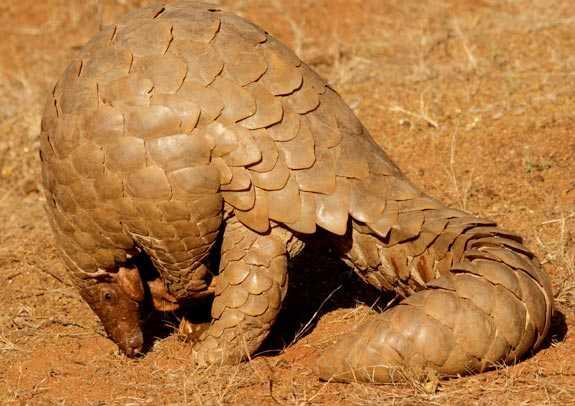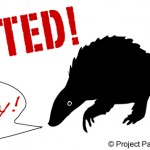An estimated 43-64 pangolins were seized from a vehicle in Vietnam on Monday.
Vietnamese officials have made their second pangolin bust of the year.
TalkVietnam reports that police discovered 304 kilograms of live pangolins from a vehicle they stopped days ago.
The seizure reflects an estimated 43-64 pangolins.
Apparently, the animals have been handed over to the provincial Department of Forest Protection.
It is unclear if any arrests were made in connection with the incident.
Five tonnes of frozen pangolin and iguana carcasses seized last month
Last month, Vietnamese authorities raided a warehouse near the Chinese border and reportedly found some 5,000 frozen pangolin and iguana carcasses.
The alleged owner of the carcasses – said to be a 30 year-old wildlife trader – apparently confessed to police that he had bought the animals from somewhere in central Vietnam and had planned to sell them in China.
However, it seems the man had not been arrested at that time and no further updates have emerged since initial reports.
At least five pangolin busts were made in Vietnam in 2011, involving at least 300 individual animals.
Local NGO fights illegal wildlife trade
A local non-profit organization, Education for Nature-Vietnam (ENV), is fighting to end illegal wildlife trade — including that of the scaly anteaters — through their tireless work with the public.
They’ve developed some wonderful education programs and have launched numerous public awareness campaigns.
Additionally, ENV established a “Wildlife Crime Unit” (WCU) in 2005, which encourages the public to report wildlife crime activities.
The WCU also has a toll-free national hotline through which citizens can easily and anonymously file reports and provide tips to aid law enforcement officers. (Locals can dial 1800 1522 and reports can also be submitted online at the ENV website.)
Last year, ENV published a report on pangolin trade in Vietnam between 2005 and 2011, which documented seizures of some 3,385 pangolins over that time. (Read more about it here.)
You can help Education for Nature-Vietnam (ENV) make a difference for Vietnam’s wildlife.
Check out ENV’s website at envietnam.org to learn more.
You can also help with a pangolin t-shirt: Project Pangolin is contributing $2.00 per t-shirt or hoodie to Education for Nature-Vietnam.
Pangolin crisis worsens
An estimated 41,000 (and perhaps as many as 60,000) pangolins were poached from the wild in 2011 alone.
This rampant slaughter is driven by an insatiable demand for the scaly anteaters that stems primarily from China and Vietnam.
There, the flesh of adults and fetuses are consumed as delicacies and for superstitions surrounding good fortune and ‘health benefits’.
Like other animal-based traditional Chinese medicines, pangolins’ blood and body parts – especially their scales – are superstitiously used as a ‘cure-all’ remedy for things like reducing swelling, improving liver function, weight loss, stimulating blood circulation, enhancing lactation in breast-feeding women, and even cancer.
There is no scientific evidence to support any of the medicinal claims made about pangolin body parts.
In fact, rhino horn and pangolin scales (much like our own hair and nails) are chiefly composed of keratin and studies have repeatedly shown rhino horn to be void of any medicinal properties.
It’s now believed that the plundering of these mammals has been greatly amplified by lucrative ‘medicinal use’ pangolin farming ventures in China, which have seem to have significantly increased the demand for these animals.
Author: Sarah Pappin. Read more about Sarah here.
Image by Sandip Kumar (own work) via Wikimedia Commons




![Indonesia: Pangolin Smugglers Doing Their Dirty Work [Photos]](http://pangolins.org/wp-content/uploads/2015/08/WorldPangolinDay2013-01-copy-150x150.jpg)

Comments are closed.